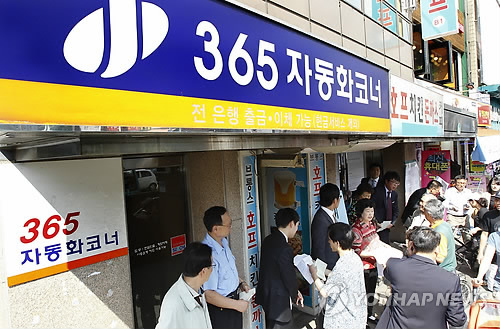Report by the central bank shows troubling signs in the local financial sector
The fiscal soundness of savings banks in South Korea has worsened despite the vigorous restructuring efforts by the financial authorities, a report showed on Thursday.
In the report titled “Financial Stability Report,” the Bank of Korea sent a clear warning about domestic savings banks whose problems, if not handled properly, could lead to a fresh round of shocks.
The BOK said that 99 savings banks here had total assets of 69.4 trillion won ($60.8 billion) as of the end of 2011, shrinking 20 percent from a year earlier. Their combined net loss surpassed 6 trillion won, as their project financing in the real estate sector turned sour.
 |
(Yonhap News) |
Other data such as default rates and the paid-in capital ratio also suffered a serious setback.
“Although the regulators had attempted to restructure the sector, savings banks are likely to see their growth decline amid continued problems linked to their management,” the central bank said.
The dire warning came after the authorities ordered savings banks to reduce nonperforming loans, whose ratio, however, remains at a high level.
The woes facing savings banks are also connected with the country’s snowballing household debts. According to the report, savings banks extended loans worth 10.6 trillion won to households as of the end of 2011, up 24.7 percent from a year earlier. Households, confronted with dwindling channels for fresh loans, tapped into the savings banks.
The bigger loans extended by savings banks to cash-strapped households are resulting in higher default rates. The BOK report showed that household loan default rates was 11.8 percent in December last year, up 1.98 percentage point from a year earlier.
The BOK report also revealed another vulnerable sector in the Korean economy: small and medium-sized enterprises. Despite the government-led efforts, SMEs continue to struggle financially. In particular, smaller enterprises recorded operating losses and saw their debt-to-asset ratio flying over 200 percent ― a worrying sign that these firms are increasingly hitting a limit amid unfavorable economic conditions.
The BOK said the Korean baby boomers ― born between 1955 and 1963 ― are retiring en masse and setting up family-owned companies, mostly restaurants, real estate and rental businesses. The sudden influx of small firms established by retirees intensified competition, resulting in more bankrupt concerns.
SMEs turned out to be sidelined by commercial banks, the report showed. Last year, local lenders increased loans for conglomerates by 30.3 percent from a year earlier, but stopped short of boosting loans for SMEs by a mere 2.4 percent during the same period.
In terms of total amounts of loans extended, the proportion dedicated to big conglomerates accounted for a record 44 percent.
“Banks chose not to increase loans for SMEs whose risks were deemed relatively higher and instead expanded collateral-based loans to reduce risks, which weakened their role as financial intermediaries,” the central bank said.
By Yang Sung-jin (
insight@heraldcorp.com)







![[Exclusive] Hyundai Mobis eyes closer ties with BYD](http://res.heraldm.com/phpwas/restmb_idxmake.php?idx=644&simg=/content/image/2024/11/25/20241125050044_0.jpg)
